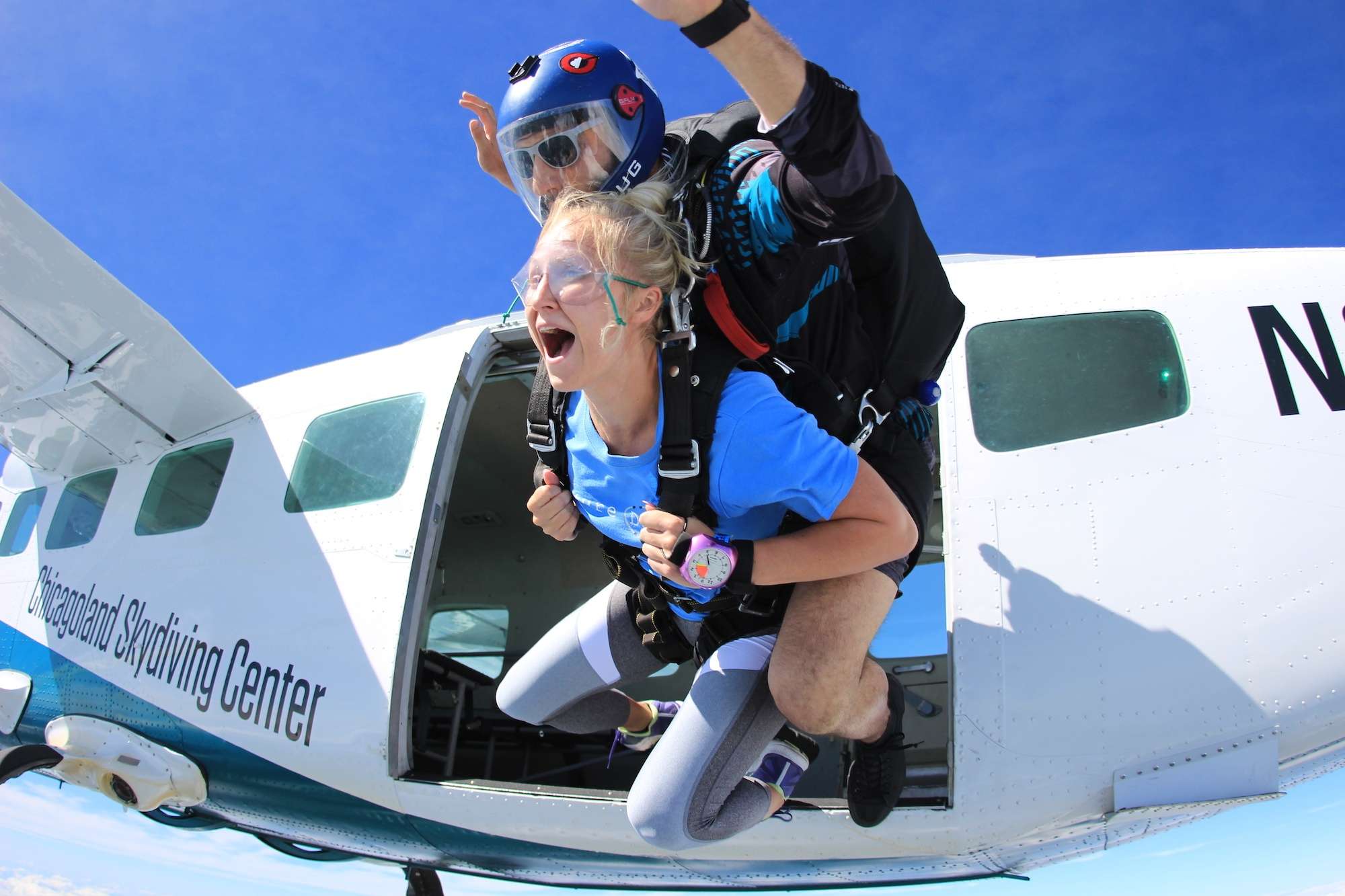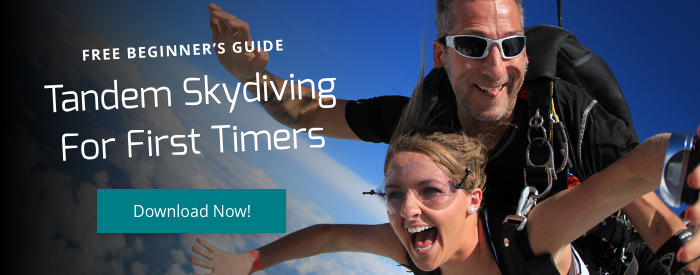You finally did it. You swallowed your nerves and booked your very first skydiving experience. How pumped are you?!
But now that the jump is approaching, stomach butterflies are fluttering and you want to make sure you’re prepared. No worries; this is all completely normal and natural.

Get ready for your tandem jump with these six tips, which we compiled specifically for first-time skydivers like you!
1. Dress appropriately for the skydive.
One of the most common questions we get from first-time skydivers is “what should I wear on the jump?” It’s a great question. The wrong clothing can take away from the thrill of the jump, but don’t stress, just follow our clothing recommendations.
Start by checking the weather forecast (and be sure it’s in the area of the skydiving center!). If it’s 75 and sunny, wear a sporty version of what you’d normally wear for a 75 degree day, like athletic shorts and a tank top.
Our best recommendation is to choose tight/well fitted clothing, because loose material can flail like crazy at 120 mph! This is also the reason that sandals or open-toed shoes aren’t allowed on the jump, or why we caution against wearing loose-fitted footwear; you’ll never see those shoes again when the wind rips them off!
“But won’t I be cold with all that wind?,” you might be wondering. A good rule of thumb: if you’re cold on the ground, you’re going to be cold in the air. If you feel you’re going to be cold, just ask for a jumpsuit, or better yet, wear long-sleeves on a brisk day! Read our FAQs to see what NOT wear on your skydive.
2. Eat like you normally would, but hydrate a little extra!
You might be afraid that if you eat a full meal you’ll get sick in the air, but skydiving on an empty stomach is not the solution. Those who do not eat or drink before their jump feel even worse— often becoming light-headed or dizzy.
Just like skydiving on an empty stomach is a bad idea, jumping with a full belly can make you nauseous. Eat a “normal” meal a few hours before your jump, just don’t overstuff yourself! Here at Chicagoland Skydiving Center, we have a convenient Flight Deck Bar & Grill, right on site. Get here early and grab a meal and make a day out of your jump.
If you are too nervous to eat, drink a power smoothie with high caloric count to keep your blood sugar level stable. Speaking of drinking, be sure to down a generous amount of water a few hours before your jump too to avoid feeling fatigued on the flight up or during the drop.
Avoid alcohol for 24 hours prior to the jump; trust us, it doesn’t work well for calming nerves, and can cause you to feel woozy or get a headache, and ruin your experience!
3. Know what to bring and what to leave behind.
When you’re a few thousand feet above the ground, you’re not going to find anything you lose while in the air. It will be gone with the wind! Because of this, it’s important to leave any valuables on the ground, either locked safety in your car or in our locker area.
A few things worth stowing away include your wallet, keys, phone, glasses or whatever else you’d normally have in your pockets. We do not allow tandem jumpers to bring a camera during your skydive for safety reasons. If you’d like to document your jump, grab one of our professional photo and video packages.
Be sure to bring appropriate jump clothes, Be sure to bring your driver’s license/ government-issued ID and a hair tie, if you have long hair. We also recommend bringing cash to use in the gift shop or to tip your tandem instructor.
Chicagoland Skydiving Center will provide you with a jumpsuit, goggles, altimeter and gloves, on cold days. That’s all you need for your first-time skydiving experience!
4. Arrive on time, or better yet, early!
If you’re a person who is normally late, add some buffer time to your travel before the jump. It’s very important to arrive on time to properly check-in, fill out any paperwork and complete your pre-jump orientation before boarding the plane.
When you arrive late, you delay your take-off time and the jumps of others. If you’re extremely tardy, you’ll be unable to jump that day and be charged a fee for your tandem skydiver’s time.
In addition to screwing up the schedule of others, your lateness will likely cause you your own added stress, which is the last thing you want if you already have first-time jumper nerves!
5. Understand proper body position during the fall and landing.
As a tandem skydiver, your tandem instructor will be taking the lead on the jump; however, there’s a few ways you can help them. Two things to remember are proper body position during the freefall and the landing.
Your tandem instructor will help you to maintain a belly-to-earth position during the fall itself. This horizontal-to-the ground placement helps you to maintain a constant velocity without speeding up during the descent. Your handy drogue parachute helps with this too, which is released soon after the jump.
When it comes time for landing, you’ll need to be able to lift and hold you legs so that your tandem instructor can touch down on the ground first. Raising your legs helps to keep them out of the way for your partner to properly absorb the impact and to avoid injury. Explore more tips for the jump itself and the landing here.
6. Accept the nerves and remember to breathe.
If you are a first-time skydiver, you are probably going to be a little nervous; there’s no way around that. But the anticipation and butterflies can be really exhilarating and help to build hype around the experience!
Instead of fixating on your fears, focus on your breathing. On the flight up, take a few deep breaths: in through your nose, and out through your mouth. Once your heart rate begins to settle, you’ll often find that your mind follows suit. Make a conscious choice to enjoy the experience.
Get Even More First-Time Skydiving Advice
These six tips are a great place to start, but we have more where that came from. Check out our other article for other tips from the experts, as well as advice from other first-time jumpers.
Curious to learn more about safety measures, like your instructor’s licensing and your skydiving equipment? We discuss all of that and more in our Tandem Skydiving for First-Timers guide. Read it right on our website or download our guide today!


